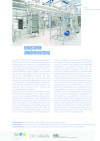Suchergebnisse
IEA IETS Annex 15: Extensions for Multi-Period MINLP Superstructure Formulation for Integration of Thermal Energy Storages in Industrial Processes (2018)

In diesem Beitrag werden Erweiterungen für eine MINLP-Superstructureformulierung für die Wärmetauscher-Netzsynthese vorgestellt. Speichermodelle, die im Annex 15 für die Erarbeitung des Prozessintegrationsframeworks verwendeten wurden, wurden in einen Beispielprozess integriert und deren Kosten verglichen.
A. Beck, R. Hofmann
Herausgeber: Computer Aided Chemical Engineering Vol. 43 (2018), p. 1335-1340
Englisch, 6 Seiten
IEA IETS Annex 15: The perfect match? 100 reasons why energy cooperation is not realized in industrial parks (2021)

Kategorisierte Liste von 100 Barrieren, die bei Energiekooperationen auftreten können.
Valerie Rodin und Simon Moser
Herausgeber: Energieinstitut an der JKU Linz
Englisch
IEA IETS Annex 15: Video-Präsentation "Combined optimization for retrofitting of heat recovery and thermal energy supply in industrial systems" (2020)

In der Präsentation wird eine im Forschungsprojekt SINFONIES entwickelte Methode zur kombinierten Optimierung von Wärmerückgewinnung und Energieversorgung von Industrieprozessen vorgestellt und anhand eines Fallbeispiels erläutert.
Daniel Halmschlager, Anton Beck, Martin Koller, Sophie Knöttner and Rene Hofmann
Herausgeber: IETS TCP
Englisch
IEA IETS TCP: Workshop-Rückblick "Circular Carbon & Industrial Symbiosis – die österreichische Perspektive" (2022)

In diesem Workshop wurden die österreichischen Erfahrungen dargestellt, österreichische Stärken in den Bereichen Forschung und Technologien erörtert und das Interesse der österreichischen Player am internationalen Austausch geklärt. Der Austausch erfolgte in Form mehrerer „Elevator Pitches“ und eines begleitenden Diskussionsformats.
Herausgeber: IEA IETS Task 21
Deutsch
IEA IETS Annex 15: Ein Schritt zu mehr Energieeffizienz in Industrieprozessen - Niederdruckdampferzeugung mit Hochtemperaturwärmepumpen (2021)

Niederdruckdampferzeugung bietet besonders in den Sektoren „Chemie und Petrochemie“ sowie „Papier und Druck“ Potentiale für eine Reduktion des Endenergieverbrauchs und des CO2-Footprints. Es gibt bereits marktverfügbare Hochtemperaturwärmepumpen, die sich zur Dampferzeugung eignen.
Franz Helminger, Sabrina Dusek, Sophie Knöttner
Herausgeber: AIT Austrian Institute of Technology GmbH
Deutsch
IEA IETS Annex 15: Webinar Präsentation - Betriebsoptimierung PLUS (2020)

Wie gekoppelte Optimierungsansätze Flexibilität aufzeigen und Effizienzpotentiale nutzbar machen. In dieser Präsentation, aus der Webinarreihe "Dekarbonisierung der Industrie", wurde ein Überblick innovativer Methoden für die Betriebsoptimierung industrieller Prozesse mittels gekoppelter Optimierungsansätze gegeben.
Knöttner, A. Beck, D. Halmschlager, R. Hofmann
Herausgeber: AIT Austrian Institute fo Technology GmbH, Institut für Energietechnik und Thermodynamik, TU Wien
Deutsch, 14 Seiten
Downloads zur Publikation
IEA IETS Annex 15: Techno-economic aspects of increasing primary energy efficiency in industrial branches using thermal energy storage (2021)

Thermische Speicher (TES) werden hinsichtlich ihrer techno-ökonomischen Charakteristiken analysiert. Der energetische und exergetische Wärmebedarf nach Temperatur wird für die österreichischen Industriebranchen bewertet. Im Zuge einer Case Study wird ein TES für die Abwärmeauskopplung aus einem Zementwerk ökonomisch bewertet.
Stefan Puschnigg, Johannes Lindorfer, Simon Moser und Thomas Kienberger
Herausgeber: Energieinstitut an der JKU Linz, Montanuniversität Leoben
Englisch
IEA IETS Task 19 Workshop: Elektrifizierung der Industrie
14. Oktober 2022
Redoutensäle, Promenade 39, 4020 Linz, AT
Dieser Workshop soll einen Überblick über das breite Thema der industriellen Elektrifizierung, ihre Bedeutung im Innovationssystem zur Dekarbonisierung, und ihren internationalen Kontext geben: Technologien für die direkte und indirekte Elektrifizierung, länderspezifische Perspektiven der IEA IETS Task 19 Teilnehmer:innen, Energieressourcennachfrage der Industrien, Nachfrage nach System- und Infrastrukturdienstleistungen.
IEA IETS Annex 15: Workshop-Rückblick "Deep Decarbonization in Industry" - Final Report

Der Workshop befasste sich in breiter Form mit den meisten wichtigen Aspekten der Dekarbonisierung. Die Präsentationen, Diskussionen, Schlussfolgerungen und Vorschläge für die weitere Arbeit wurden in dem Abschlussbericht zusammengefasst.
Chris Bataille, Simon Fraser, Andrea Ramirez, Rene Hofmann, Stefan Lechtenboehmer, Elvira Lutter, Philippe Navarri, Thore Berntsson
Herausgeber: IETS TCP
Englisch, 38 Seiten
Downloads zur Publikation
IEA IETS Annex 15: Increasing Energy Efficiency in Pulp and Paper Production by Employing a New Type of Latent Heat Storage (2018)

Latentwärmespeicher zur Wärmerückgewinnung in der Zellstoff- und Papierproduktion werden vorgestellt und analysiert.
C. Zauner, R. Hofmann, B. Windholz
Herausgeber: Computer Aided Chemical Engineering Vol. 43 (2018), p. 1359-1364
Englisch, 6 Seiten
IEA IETS Task 21: Artikel - Improving Energy Efficiency of Carbon Capture Processes with Heat Pumps (2024)

In diesem Beitrag wird die Integration von Wärmepumpen im Aminwäscheprozess zur Abscheidung von CO2 aus dem Abgas eines Industrieofens untersucht. Der Einsatz einer dampferzeugenden Wärmepumpe kann den Energieverbrauch um 50% reduzieren.
Veronika Wilk, Daniela Leibetseder, Christoph Zauner, Andreas Rath, Michael Schwaiger
Herausgeber: 2024
Englisch, 18 Seiten
Downloads zur Publikation
Artikel in der Zeitschrift "nachhaltige technologien" Ausgabe 2017-3: Industrielle Abwärmenutzung

Im Artikel wird das Projekt Annex 15 zur Optimierung und Weiterentwicklung von energie- und kosteneffizienten Technologien für die Nutzung industrieller Abwärme dargestellt.
Herausgeber: AEE - Dachverband
Deutsch, 1 Seiten
Downloads zur Publikation
IEA IETS Annex 15: Techno-economic aspects of increasing primary energy efficiency in industrial branches using thermal energy storage (2021)

Eine Anwendungsmatrix für die Integration von möglichen Wärmespeichern in unterschiedlichen Industriebranchen, klassifiziert nach Temperaturniveau, wurde erstellt.
Stefan Puschnigga, Johannes Lindorfera, Simon Mosera, Thomas Kienbergerb
Herausgeber: Journal of Energy Storage
Englisch
IEA IETS Annex 15: Optimal Integration of a Stratified Thermal Energy Storage into a Multi-Component Industrial Energy System (2020)

In dem Beitrag wurde ein im Zuge des Forschungsprojektes EDCSproof entwickeltes Optimierungsmodell für zentral eingebundene Schichtspeicher vorgestellt und seine Funktion in Anlehnung an einen realen Anwendungsfall demonstriert.
Dipl.-Ing. Karl-Wilhelm Schenzel, Univ.Prof. Dr. René Hofmann
Herausgeber: Institut für Energietechnik und Thermodynamik, TU Wien
Englisch, 6 Seiten
Österreich im IEA Implementing Agreement Industrial Energy-Related Technologies and Systems (IETS)

Elvira Lutter
Herausgeber: Klima - und Energiefonds
Deutsch, 9 Seiten
Downloads zur Publikation
IEA IETS Task 21: Dekarbonisierung industrieller Systeme in einer Kreislaufwirtschaft (Arbeitsperiode 2022 - 2024)
Energie- und CO2-Einsparungen durch Zirkularität des Kohlenstoffs, und die Ressourcen- und Energieeffizienz durch Industrielle Symbiose sind zwei Lösungsansätze zur Dekarbonisierung der Industrie. Im Subtask „Circular Carbon“ wurden die technische Integration von CCU in industrielle Systeme und deren Beurteilung in der LCA betrachtet. Im Subtask „Industrial Symbiosis“ wurde hinterfragt, wie Industrielle Symbiose initiiert werden kann und welche Business Models sich für ihre Realisierung eignen.
IEA IETS Task 21: Decarbonizing industrial systems in a circular economy framework (working period 2022 - 2024)
Energy and CO2 savings through circular economy, especially directly through carbon circularity (CCU), and resource and energy efficiency through industrial symbiosis are two key approaches to decarbonizing industry.
